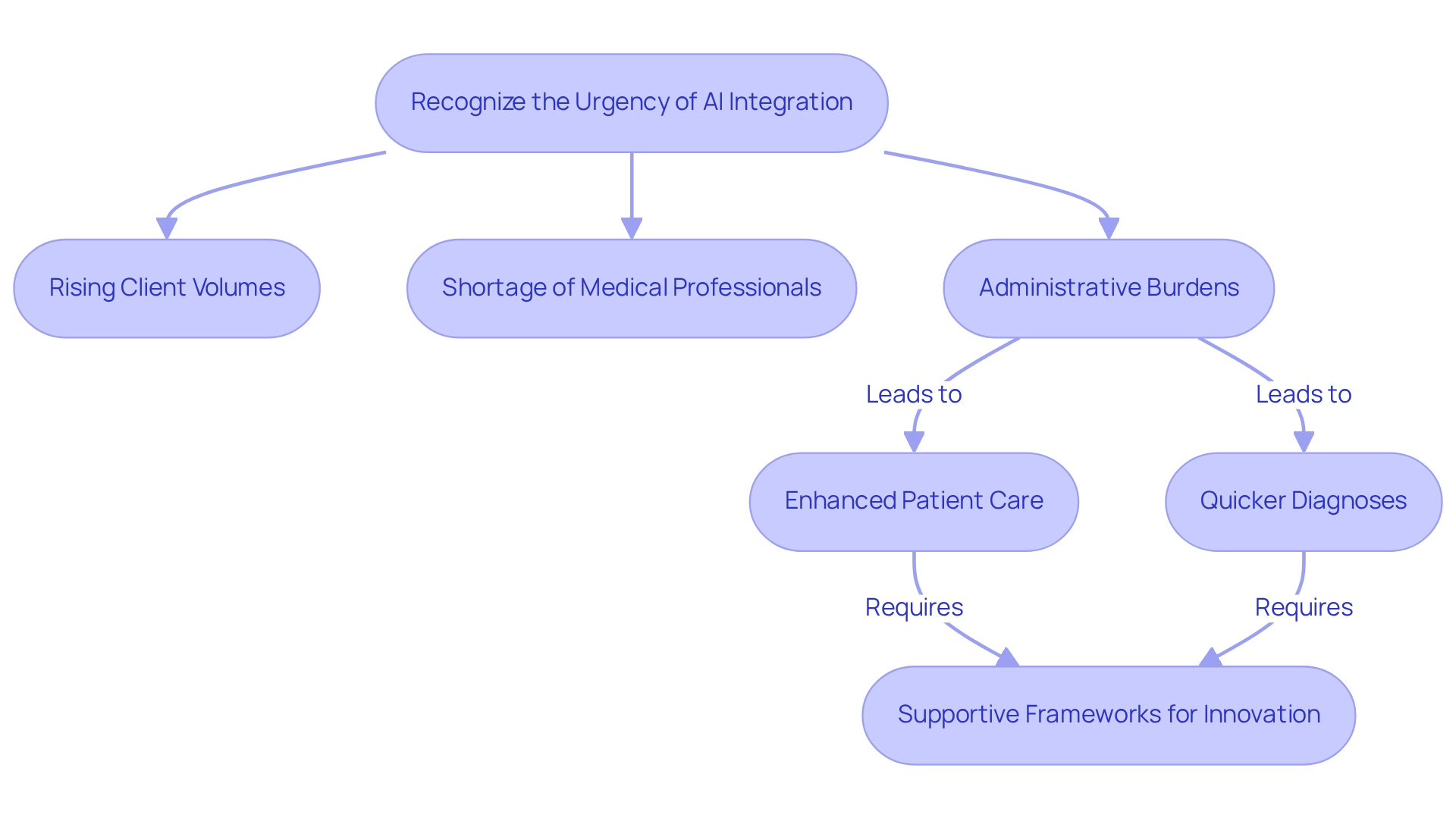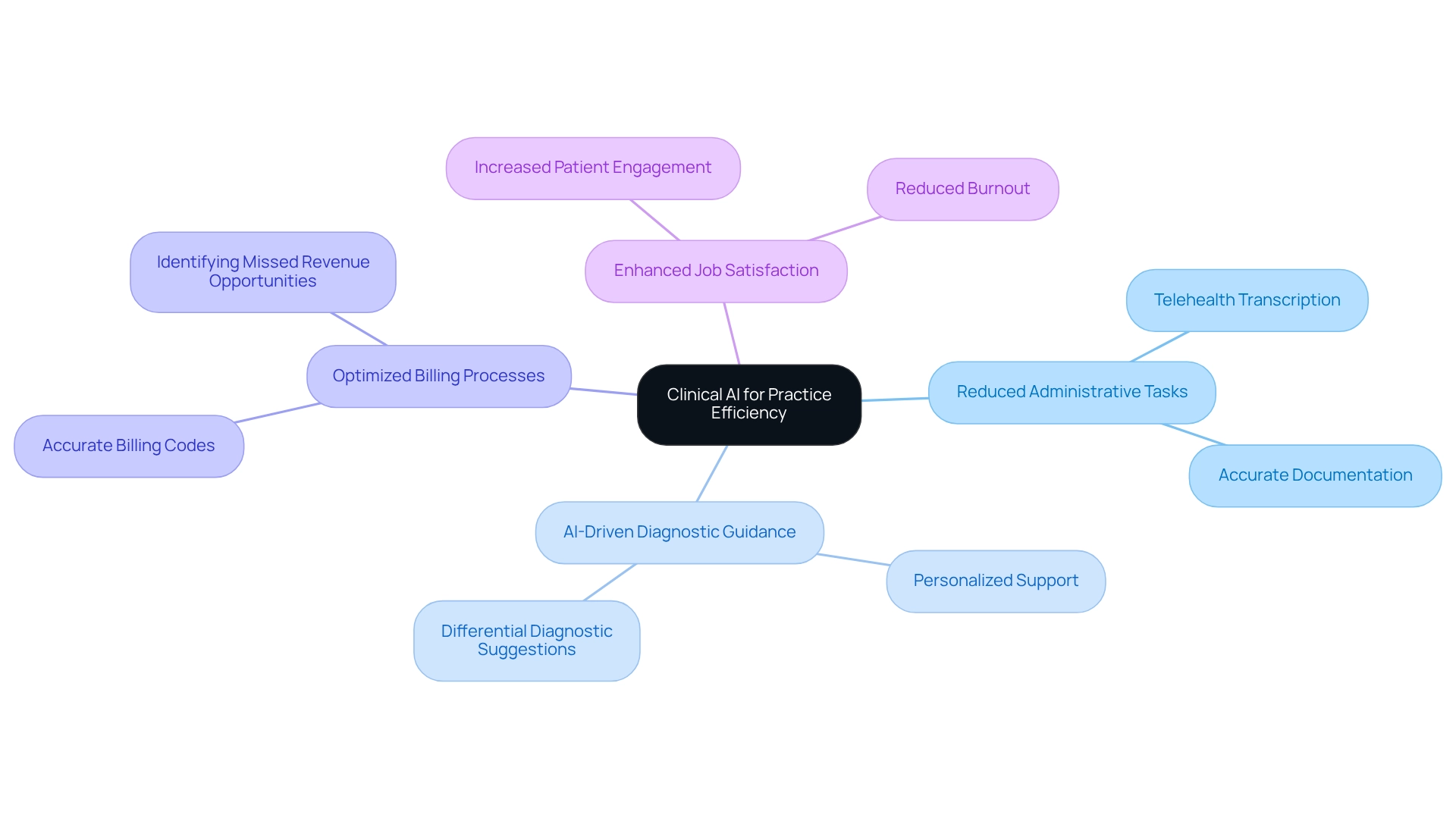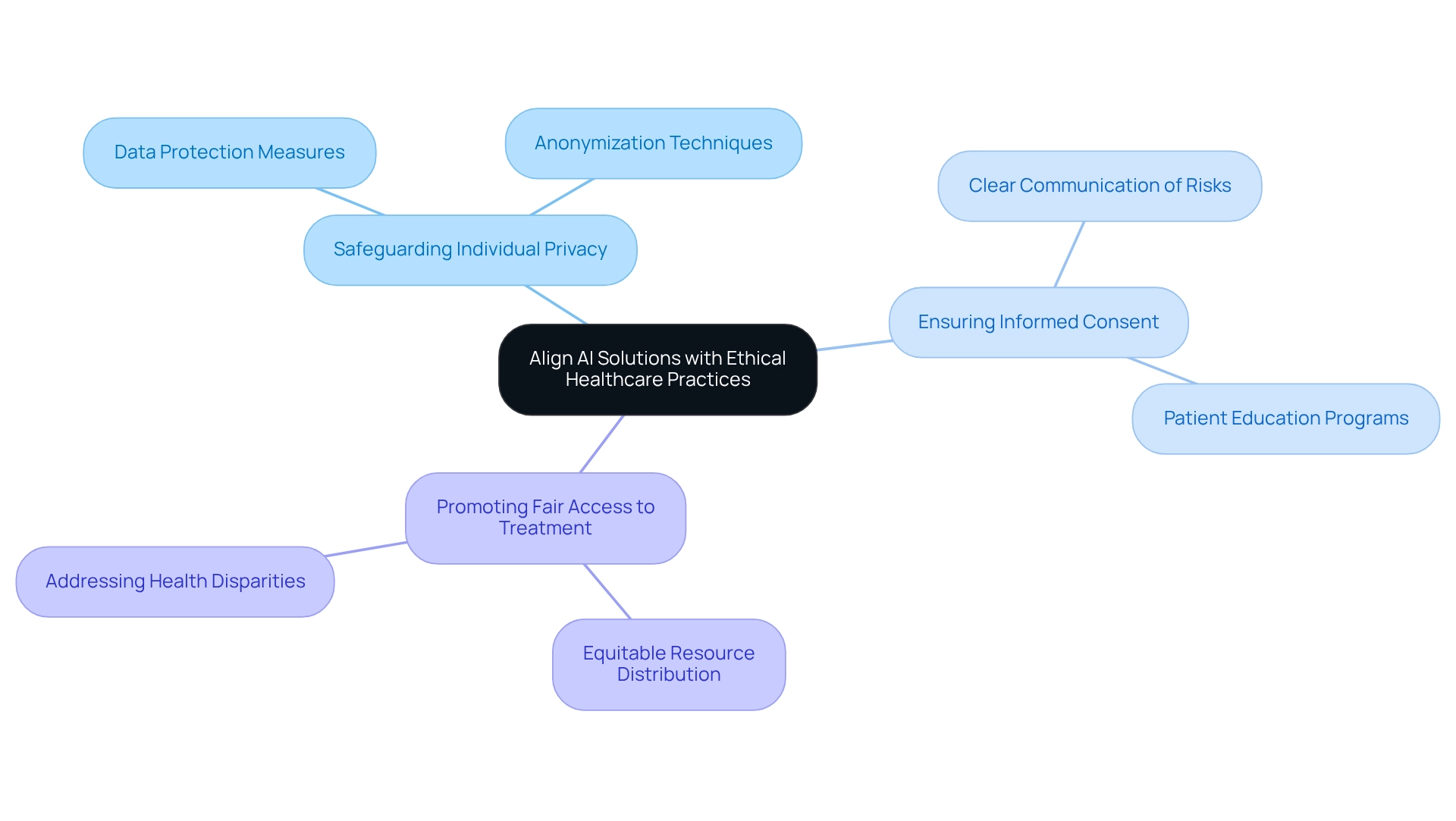Overview
Healthcare providers often face emotional challenges that can weigh heavily on their ability to deliver care. The administrative burdens they encounter can detract from their primary focus: the well-being of their patients. This is where clinical AI company solutions come into play, offering a compassionate response to these pressing issues.
By automating essential tasks like appointment scheduling and billing, AI technology significantly reduces these burdens. Imagine the relief clinicians feel when they can devote more time to patient care rather than paperwork. This shift not only enhances the quality of care but also supports the principles of personalized medicine, addressing the unique needs of each patient.
Moreover, these solutions help tackle the emotional challenges faced by healthcare professionals. With less time spent on administrative duties, providers can engage more deeply with their patients, fostering stronger connections and improving overall satisfaction.
Are you ready to explore how these innovative solutions can transform your practice? Embracing clinical AI can lead to a more efficient and compassionate healthcare environment, ultimately benefiting both providers and patients alike. Let's take this step together towards a brighter future in healthcare.
Introduction
The healthcare industry finds itself at a critical juncture, where integrating artificial intelligence (AI) is not merely advantageous but essential for addressing the complexities of modern patient care. Healthcare providers face increasing patient demands alongside a dwindling workforce, creating immense pressure to enhance operational efficiency while ensuring high-quality care. Here, AI technologies shine as a beacon of hope, transforming administrative tasks and diagnostic processes, thus allowing clinicians to focus on what truly matters—their patients.
As we navigate this evolving landscape, it becomes crucial to understand the benefits of clinical AI and to align these innovations with ethical practices. How can we ensure that technology serves to enhance, rather than hinder, the compassionate care that patients deserve? This article explores the urgent need for AI integration in healthcare, highlighting its potential to revolutionize patient engagement and improve overall care delivery. Together, we can embrace these advancements and foster a system that truly supports both healthcare providers and the patients they serve.
Recognize the Urgency of AI Integration in Healthcare
The medical environment is undergoing a profound transformation, driven by the increasing complexity of individual needs and the mounting pressures on caregivers. Are you feeling overwhelmed by the rising client volumes and the shortage of medical professionals? The integration of solutions from a clinical AI company has never been more essential. These technologies can alleviate administrative burdens, automating tasks such as appointment scheduling, managing medical records, and handling billing procedures. This enables providers to focus on what truly matters: the well-being of their patients.
By lightening the load of time-consuming administrative tasks, AI empowers clinicians to spend more time engaging directly with individuals, ultimately enhancing the quality of care. Imagine a world where diagnostic procedures are expedited through the analysis of vast amounts of medical data, leading to quicker and more accurate diagnoses. This proactive approach not only boosts operational efficiency but also fosters a collaborative environment where patients are encouraged to take charge of their wellness journey through technology.
Additionally, AI tools can enhance remote patient monitoring and personalized medicine, further elevating patient engagement and outcomes. The current medical landscape demands innovative solutions, making the adoption of a clinical AI company crucial for sustainable healthcare delivery. However, it is important to recognize that medical startups face challenges in integrating these technologies. We must advocate for supportive frameworks that encourage innovation and make these advancements accessible to all.

Understand the Benefits of Clinical AI for Practice Efficiency
A clinical AI company provides solutions that deliver a wealth of benefits, significantly enhancing practice efficiency, particularly in addressing the emotional challenges faced by healthcare providers. One of the most pressing concerns is the time spent on administrative tasks, which can contribute to physician burnout and disjointed support. Imagine how much more fulfilling your work could be if AI could assist with telehealth transcription and summarization, ensuring accurate documentation without adding to your burden. This newfound efficiency allows you to redirect valuable hours back to the patients you care for.
Moreover, AI-driven diagnostic guidance offers personalized support by providing differential diagnostic suggestions based on individual interactions, which can be invaluable in clinical decision-making. Have you ever felt overwhelmed by the complexities of patient care? AI can help lighten that load. The financial implications are also noteworthy; AI can optimize billing processes by suggesting accurate billing codes and identifying missed revenue opportunities. This means that medical providers can experience not only improved operational efficiency but also increased revenue and enhanced job satisfaction, as they focus more on meaningful patient engagement rather than paperwork.
By embracing AI technology, the clinical AI company in the medical sector can effectively tackle these significant challenges. Together, we can transform medical delivery and enhance patient-centric care. Are you ready to explore how AI can support your practice and improve your connection with patients?

Align AI Solutions with Ethical Healthcare Practices
As AI technologies become increasingly integrated into medical services, it is crucial to align these solutions with ethical practices. For faith-focused healthcare providers, particularly those adhering to Catholic teachings, it is vital that AI applications respect and uphold moral values. This commitment involves:
- Safeguarding individual privacy
- Ensuring informed consent
- Promoting fair access to treatment
At CosmaNeura, we understand the emotional challenges healthcare providers face, especially when administrative burdens impact patient care. Our AI systems are specifically designed to support ethical decision-making, offering recommendations that align with the principles of beneficence and nonmaleficence. Imagine having AI that improves healthcare by providing customized treatment plans that consider individual values and preferences, ultimately easing the burdens on physicians.
By incorporating ethical factors into AI development and execution, medical institutions can foster a culture of trust and responsibility. This ensures that technology enhances rather than undermines the quality of care for individuals. Through our commitment to empowering physicians, CosmaNeura aims to revolutionize healthcare, enabling providers to focus on what truly matters—caring for their patients. Together, we can create a future where technology and compassion go hand in hand.

Conclusion
The integration of artificial intelligence in healthcare is not merely a trend; it is an urgent necessity. Healthcare providers face increasing complexity in patient needs, and the pressures they encounter can be overwhelming. By streamlining administrative tasks and enhancing diagnostic processes, AI empowers clinicians to dedicate more time to patient care, ultimately leading to improved health outcomes. Imagine a world where the potential for AI transforms practice efficiency, alleviating physician burnout and fragmented care while optimizing financial processes.
Yet, as we embrace these technological advancements, we must not overlook the ethical implications. It is vital that AI solutions align with our moral values, ensuring patient privacy, informed consent, and equitable access to care. By embedding ethical considerations into AI development, we can cultivate trust and accountability, ensuring that technology enhances, rather than hinders, compassionate care.
As the healthcare landscape evolves, our commitment to integrating AI responsibly will be crucial. This approach fosters a system that supports both healthcare providers and patients. Embracing these innovations prepares us for future challenges and reaffirms our core mission: to provide high-quality, patient-centered care that respects individual values and needs. The time to act is now; the potential of AI to revolutionize healthcare delivery is within reach. Let us move forward together, ensuring that our advancements in technology serve the heart of healthcare—compassionate, personalized care.




